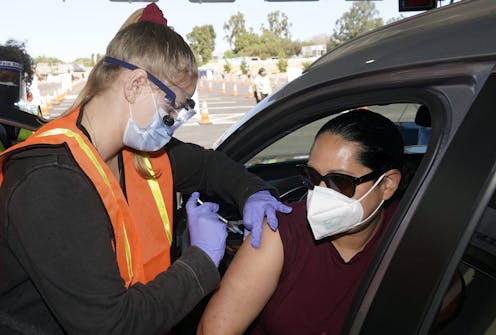Can health insurance companies charge the unvaccinated higher premiums? What about life insurers? 5 questions answered
- Written by Kosali Simon, Professor of Health Economics, Indiana University

The current COVID-19 wave in the U.S. is mostly affecting unvaccinated Americans, who represent more than 95% of current cases of hospitalization and death[1].
Given the average cost of a COVID-19 hospitalization in 2020 ran about US$42,200 per patient[2], will the unvaccinated be asked to bear more of the cost of treatment, in terms of insurance, as well?
We asked economists Kosali Simon[3] and Sharon Tennyson[4] to explain the rules governing how health and life insurers can discriminate among customers based on vaccination status and other health-related reasons.
1. Can insurers charge the unvaccinated more?
This is a really interesting question and depends on the type of insurance.
Life insurance companies have the freedom to charge different premiums based on risk factors that predict mortality. Purchasing a life insurance policy often entails a health status check or medical exam, and asking for vaccination status is not banned.
Health insurers are a different story. A slew of state and federal regulations[5] in the last three decades have heavily restricted[6] their ability to use health factors in issuing or pricing polices. In 1996, the Health Insurance Portability and Accountability Act began prohibiting[7] the use of health status in any group health insurance policy. And the Affordable Care Act, passed in 2014, prevents insurers[8] from pricing plans according to health – with one exception: smoking status.
2. Are premiums or coverage being affected yet?
Fortune recently reported that while several of the biggest U.S. life insurance companies aren’t yet asking customers[9] for their vaccination status, a few insurers told the magazine they are doing so for people at high risk. It wasn’t clear from the article whether this is affecting premiums.
A recent study comparing life insurance policies from 2014 through February 2021 found that premiums and coverage didn’t change a lot[10] during the pandemic. The study did find some evidence that policy terms for the oldest individuals and those with high-risk health conditions did worsen.
The authors of the study suggested that the rapid development of vaccines may be why life insurance markets haven’t yet shown a dramatic response to COVID-19, but their work does not distinguish the vaccinated from the unvaccinated.
It’s important to note that no matter what, premiums and coverage on existing life insurance plans won’t change, so a death due to COVID-19 will definitely be covered. In general, denial of life insurance claims is rare and occurs only for specific documented reasons[11].
3. So smokers may pay higher premiums?
In life insurance, smokers definitely pay higher premiums, as do people who are obese.
ValuePenguin, a unit of LendingTree that provides research and analysis, found that smokers typically pay[12] over three times more for life insurance than non-smokers.
The site also found that obesity increases premiums[13] by about 150% – or more if the person also has medical conditions associated with being overweight.
As for health insurance pricing, the Affordable Care Act allows insurers to increase premiums[14] by up to 50% for smokers. The difference between what smokers and non-smokers pay may actually be higher because the former can’t use a key government subsidy[15] to pay for the smoker surcharge.
The ACA makes no similar exception for obesity.
4. How about discounts for the vaccinated?
There is a tool health insurers – including self-insured employers – have to lower premiums to those who are vaccinated: wellness incentives.
Just as insurers and companies offer discounts for things like trying to lose weight or stop smoking, they are also permitted[16] to reduce the health insurance premiums that vaccinated employees pay.
In 2019, the average maximum incentive offered by employers[17] for workers to participate in wellness activities was $783 per year.
Some employers are already incentivizing COVID-19 vaccinations this way. For example, Missouri State University offers a $20-a-month discount[18] on health insurance premiums for employees who got a COVID-19 jab. Others are considering similar discounts[19].
And so, even though insurers can’t charge the unvaccinated higher premiums, people who refuse to get a shot can end up paying more than their vaccinated colleagues.
5. Do insurers consider other vaccine or flu shots in rates?
To the best of our knowledge, insurers haven’t specifically used vaccination status or getting a flu shot in setting premiums.
As part of having access to your medical records, life insurers might get to know whether you received vaccinations, but there are no systems in place to verify each year whether you got your flu shot. Health insurers can’t ask about vaccine status for the reasons listed above.
Employers can offer incentives to get a flu shot through their wellness programs.
[Like what you’ve read? Want more? Sign up for The Conversation’s daily newsletter[20].]
References
- ^ represent more than 95% of current cases of hospitalization and death (www.cnn.com)
- ^ ran about US$42,200 per patient (doi.org)
- ^ Kosali Simon (scholar.google.com)
- ^ Sharon Tennyson (scholar-google-com.proxy.library.cornell.edu)
- ^ slew of state and federal regulations (doi.org)
- ^ have heavily restricted (www.doi.org)
- ^ began prohibiting (www.hhs.gov)
- ^ prevents insurers (www.cms.gov)
- ^ several of the biggest U.S. life insurance companies aren’t yet asking customers (www.yahoo.com)
- ^ premiums and coverage didn’t change a lot (doi.org)
- ^ occurs only for specific documented reasons (content.naic.org)
- ^ found that smokers typically pay (www.valuepenguin.com)
- ^ obesity increases premiums (www.valuepenguin.com)
- ^ allows insurers to increase premiums (www.cms.gov)
- ^ can’t use a key government subsidy (www.doi.org)
- ^ they are also permitted (www.kff.org)
- ^ offered by employers (www.kff.org)
- ^ offers a $20-a-month discount (www.missouristate.edu)
- ^ Others are considering similar discounts (www.shrm.org)
- ^ Sign up for The Conversation’s daily newsletter (theconversation.com)
















